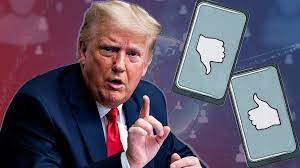Analyzing Trump’s Facebook ousting

On Wednesday, May 5, the Independent Oversight Board of the social media giant Facebook decided, unanimously, to maintain the exclusion of former United tates President from the platform, and recommended the company review the decision in 6 months writes Rodrigo Noriega in La Prensa
The Council was created in 2019 by the company to give its opinion on controversial matters that the platform or users presented for its consideration. The group is made up of 20 personalities that include journalists, defenders of freedom of expression and defenders of human rights. It is the only institution of its kind among all social networks today.
The Council, which is also popularly known as the “supreme court” of Facebook, arose as a result of the great criticism and questioning of the social network, due to its indifferent attitude to the abuses committed using the platform in 2016 to manipulate public opinion to favor of Trump, in the United States elections, and by a large number of other controversies in which Facebook was pigeonholed as an amoral company, indifferent to human rights violations.
The decision against Trump
On January 6 of this year, a mob of about 10,000 followers of the then still president of the United States surrounded the complex of buildings in which the Congress of that country is based. At that precise moment, the House of Representatives counted the electoral records that confirmed the triumph of Democrat Joe Biden. Barring the opposition of a group of Republican MPs, the act would conclude with the third confirmation that Biden was the elected president of the United States. The Trump-instigated mob entered the Capitol seeking to disrupt the event and persecute politicians who had allegedly betrayed Trump, or who had stood out for opposing the president. At that time all the major internet platforms, Google, Facebook and Twitter, closed Trump’s accounts to prevent him from instigating more violence.
Although the closure of the accounts had its effect, the criticism against the platforms did not wait. One side questioned them for not having canceled Trump years before, while from another angle the platforms were criticized for their selectivity, since they had closed Trump’s account and not that of Nicolás Maduro or Jair Bolsonaro, for example.
According to the newspaper El País of Spain, referring to the former US president and the platforms, it says: “Trump had more than 35 million followers on this platform [Facebook], more than 24 million on Instagram and about 88 million on Twitter”. Closing someone’s accounts with these numbers is not easy. In particular for Facebook, since this company is the owner of Instagram and WhatsApp. However, the company made the decision to review its procedure before its Independent Supervisory Board, which confirmed the decision.
Is private censorship legitimate?
US Supreme Court Justice Oliver Wendell Holmes Jr. (1841-1935) used the phrase “the strictest protection of free speech would not protect a man if he falsely yelled ‘fire’ in a theater full of spectators, to provoke panic ”. Although this mention appears in the Schenck v. United States 1919 case, there are still many critics in American academia who disqualify this notion as a judicial principle. However, the courts in that country routinely apply it.
Beyond the obvious analogy between inciting violence on Capitol Hill and screaming to cause panic in a crowded theater, there are other arguments that also allow a private company to cancel a client’s account for the content of their expressions. Those arguments refuse to apply the doctrine of “essential facility” to social media.
In the legal field of free competition, the good or service generated by a company, which is so dominant in the market, is considered an essential facility that if it does not allow indiscriminate access to that good or service there is no competition. In Trump’s case, the essential facility would be equivalent to an internet company that refuses to serve you because of your opinions, or the power company that leaves you in the dark because of the way you think. Although there are those who think that Facebook and Google (and Amazon too) are essential facilities, there are no judicial declarations or laws that establish it in the United States (in Europe they consider Google as such). In the case of essential facilities, if Trump were a company or a merchant that needed access to Facebook to do business,
In the real world, there is a multiplicity of media and social networks (including the one that Trump has just founded), in which the former president can disseminate his opinions. In any case, neither Trump nor anyone else has the right to force a social network to communicate a message that can cause harm.





